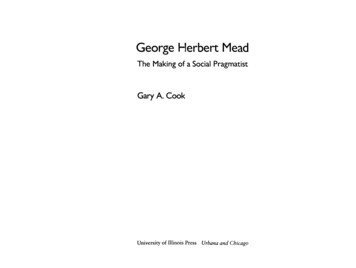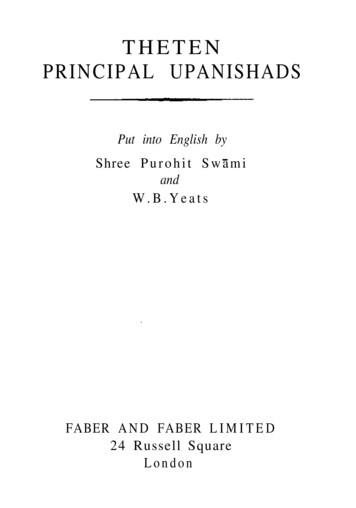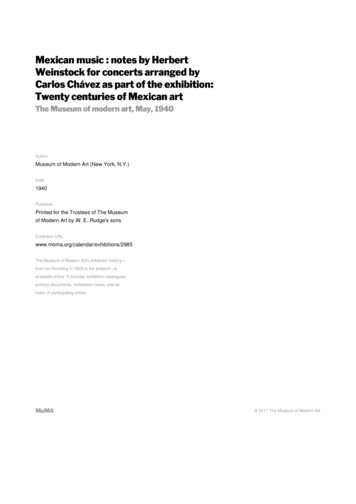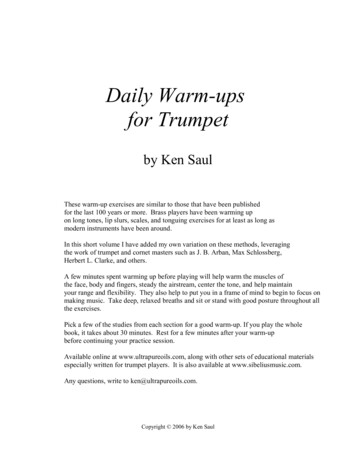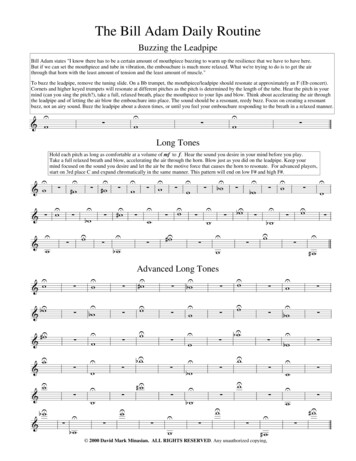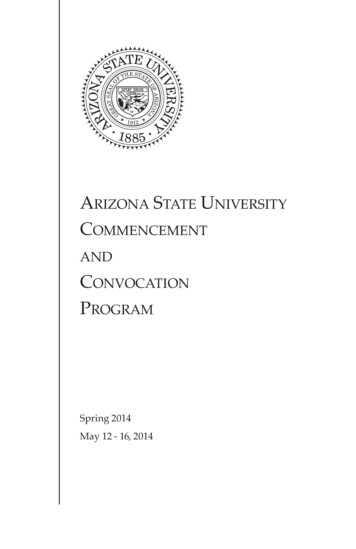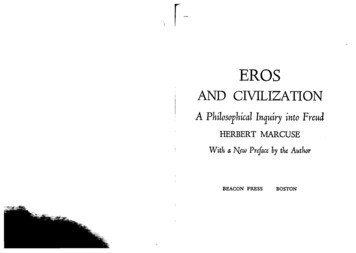
Transcription
rEROSAND CIVILIZATIONA Philosophical Inquiry into FreudHERBERT MARCUSEWith a N ew Preface by the AuthorBEACON PRESSBOSTON
ru6EROS AND CIVILIZATIONself-development of Eros. As early as Plato, this conceptionappears as an archaic-mythical residue. Eros is being ab.sorbed into Logos, and Logos is reason which subdues theinstincts. The history of ontology reflects the reality prin·ciple which governs the world ever more exclusively: Theinsights contained in the metaphysical notion of Eros weredriven underground. They survived, in eschatological dis·tortion, in many heretic movements, in the hedonistic phi·losophy. Their history has still to be written- as has thehistory of the transformation of Eros in Agape.19 Freud'sown theory follows the general trend: in his work, the rationality of the predominant reality principle supersedesthe metaphysical speculations on Eros.We shall presently try to recapture the full content of hisspeculations.se See Anders Nygren, Agape and Ero11 (Philadelphia: WestminsterPress, 1953).PART TWOBEYOND THE REALITY PRINCIPLE"What time has been wasted during man's destiny in thestruggle to decide what man's next world will be like! The keenerthe effort to find out, the less he knew about the present one helived in. The one lovely world be knew, lived in, that gave him allhe had was, according to preacher and prelate, the one to be least inhisHe was recommended, ordered, from the day of hisbirth to bid goodbye to it. Oh, we have had enough of the abuseof this fair earth! It is no sad truth that this should be our home.Were it but to give us simple shelter, simple clothing, simple food,adding the lily and the rose, the apple and the pear, it would be afit home for mortal or immortal man."Sean O'Casey, Sunset and Evening Star
rIIICHAPTER SIXThe Historical Limits of theEstablished Reality PrincipleThe preceding analysis tried to identify certain basictrends in the instinctual structure of civilization and, particularly, to define the specific reality principle which hasgoverned the progress of Western civilization. We designated this reality principle as the performance principle;and we attempted to show that domination and alienation,derived from the prevalent social organization of labor, determined to a large extent the demands imposed upon theinstincts by this reality principle. The question was raisedwhether the continued rule of the performance principleas the reality principle must be taken for granted (so thatthe trend of civilization must be viewed in the light of thesame principle), or whether the performance principle hasperhaps created the preconditions for a qualitatively different, non-repressive reality principle. This question suggested itself when we confronted the psychoanalytical theory of man with some basic historical tendencies:( 1) The very progress of civilization under the performance principle has attained a level of productivity at whichthe social demands upon instinctual energy to be spent inalienated labor could be considerably reduced Conse-
130EROS AND CIVILIZATIONquently, the continuedorganization of the instincts seems to be necessitated less by the "struggle forexistence" than by the interest in prolonging this struggle-by the interest in domination.(2) The representative philosophy of Western civilization has developed a concept of reason which contains thedomineering features of the performance principle. However, the same philosophy ends in the vision of a higherform of reason which is the very negation of these features-namely, receptivity, contemplation, enjoyment. Behindthe definition of the subject in terms of the ever transcending and productive activity of the ego lies the image of theredemption of the ego: the coming to rest of all transcendence in a mode of being that has absorbed all becoming,that is for and with itself in all otherness.The problem of the historical character and limitation ofthe ·performance principle is of decisive importance forFreud's theory. We have seen that he practically identifiesthe established reality principle (i.e., the performance principle) with the reality principle as such. Consequently, hisdialectic of civilization would lose its finality if the performance principle revealed itself as only one specific historical form of the reality principle. Moreover, since Freudalso identifies the historical character of the instincts withtheir " nature," the relativity of the performance principlewould even affect his basic conception of the instinctualdynamic between Eros and Thanatos: their relation andits development would be different under a different realityprinciple. Conversely, Freud's instinct theory providesone of the strongest arguments against the relative (his-HISTORICAL LIMITS131torical) character of the reality principle. If sexuality is inits very essence antisocial and asocial, and ifis the manifestation of a primary instinct, then the idea ofa non-repressive reality principle would be nothing but idlespeculation.Freud's instinct theory indicates the direction in whichthe problem must be examined. The performance principle enforces an integrated repressive organization of sexuality and of the destruction instinct. Therefore, if the historical process tended to make obsolete the institutions ofthe performance principle, it would also tend to make obsolete the organization of the instincts- that is to say, to release the instincts from the constraints and diversions required by the performance principle. This would implythe real possibility of a gradual elimination of surplus-repression, whereby an expanding area of destructiveness couldbe absorbed or neutralized by strengthened libido. Evidently, Freud's theory precludes the construction of anypsychoanalytical utopia. If we accept his theory and stillmaintain that there is historical substance in the idea of anon-repressive civilization, then it must be derivable fromFreud's instinct theory itself. His concepts must be examined to discover whether or not they contain elementsthat require reinterpretation. This approach would parallel the one used in the preceding sociological discussion.There, the attempt was made to " read off" the ossificationof the performance principle from the historical conditionswhich it has created; presently, we shall try to " read off"from the historical vicissitudes of the instincts the possibility of their non-repressive development. Such an approachj
1331 33EROS AND CIVILIZATIONHISTORICAL LIMITSimplies a critique of the established reality principle in thename of the pleasure principle- a re-evalution of the antagonistic relation that has prevailed between the two dimensions of the human existence.Freud maintains that an essential conflict between thetwo principles is inevitable; however, in the elaborationof his theory, this inevitability seems to be opened to question. The conflict, in the form it assumes in civilization, issaid to be caused and perpetuated by the prevalence ofAnanke, Lebensnot, the struggle for existence. (The laterstage of the instinct theory, with the concepts of Erosand death instinct, does not cancel this thesis: Lebensnotnow appears as the want and deficiency inherent in organiclife itself.) The struggle for existence necessitates the repressive modification of the instincts chiefly because of thelack of sufficient means and resources for integral, painlessand tailless gratification of instinctual needs. If this is true,the repressive organization of the instincts in the strugglefor existence would be due to exogenous factors - exogenous in the sense that they are not inherent in the " nature " of the instincts but emerge from the specific historical conditions under which the instincts develop. According to Freud, this distinction is meaningless, for theinstincts themselves are historical "; 1 there is no instinctual structure outside " the historical structure. However, this does not dispense with the necessity of makingthe distinction -except that it must be made within thehistorical structure itself. The latter appears as stratified ontwo levels: (a) the phylogenetic-biological level, the development of the animal man in the strugglC? with nature;and (b) the sociological level, the development of civilizedindividuals and groups in the struggle among themselvesand with their environment. The two levels are in constantand inseparable interaction, but factors generated at thesecond level are exogenous to the first and have therefore adifferent weight and validity (although, in the course of thedevelopment, they can " sink down " to the first level) :they are more relative; they can change faster and withoutendangering or reversing the development of the genus.This difference in the origin of instinctual modification underlies the distinction we have introduced between repression and surplus-repression; 1 the latter originates and is sustained at the sociological level.Freud is well aware of the historical element in man's instinctual structure. In discussing religion as a specific historical form of illusion," he adduces against himself theargument: Since men are so slightly amenable to reasonable arguments, so completely are they ruled by their instinctual wishes, why should one want to take away fromthem a means for satisfying their instincts and replace itby reasonable arguments?" And he answers: "Certainlymen are like this, but have you asked yourselves whetherthey need be so, whether their inmost nature necessitatesit? " 1 However, in his theory of instincts, Freud does notdraw any fundamental conclusions from the historical distinction, but ascribes to botl1 levels equal and general valid·See, for example, Beyond the Plet1SUTB Principk (New York:right Publishing C01:p., 19 so), PP· 47 49·12See page 37 above.a The Future of an IUusion1949), p. 81.". . .(New York: L1venght Publishing Corp.,
1 34EROS AND CIVILIZATIONity. For his metapsychology, it is not decisivetheinhibitions are imposed by scarcity or by the hierarchicaldistribution of scarcity, by the struggle for existence or bythe interest in domination. And indeed the two factors the phylogenetic-biological and the sociological- havegrown together in the recorded history of civilization. Buttheir union has long since become " unnatural " - and sohas the oppressive " modification " of the pleasure princiJ?leby the reality principle. Freud's consistent denial of thepossibility of an essential liberation of the former impliesthe assumption that scarcity is as permanent as domination-an assumption that seems to beg the question. By virtueof this assumption, an extraneous fact obtains the theoretical dignity of an inherent element of mental life, inherenteven in the primary instincts. In the light of the long-rangetrend of civilization, and in the light of Freud's own interpretation of the instinctual development, the assumptionmust be questioned. The historical possibility of a gradualdecontrolling of the instinctual development must be takenseriously, perhaps even the historical necessity- if civilization is to progress to a higher stage of freedom.To extrapolate the hypothesis of a non-repressive civilization from Freud's theory of the instincts, one must reexamine his concept of the primary instincts, their objectives and their interrelation. In this conception, it is mainlythe death instinct that seems to defy any hypothesis of anon-repressive civilization: the very existence of such an instinct seems to engender "automatically" the whole network of constraints and controls instituted by civilization;innate destructiveness must beget perpetual repression.13)HISTORICAL LIMITSOur re-examination must therefore begin with Freud's analysis of the death instinct.We have seen that, in Freud's late theory of the instincts,the " compulsion inherent in organic life to restore anearlier state of things which the living entity has beenobliged to abandon under the pressure of external disturbing forces " ' is common to both primary instincts: Erosand death instinct. Freud regards this retrogressive tendency as an expression of the " inertia " in organic life, andventures the following hypothetical explanation: at the timewhen life originated in inanimate matter, a strong "tension " developed which the young organism strove to relieveby returning to the inanimate condition.1 At theof organic life, the road to the previous state of morgamcexistence was probably very short, and dying very easy; butgradually " external influences " lengthened this road andcompelled the organism to take ever longer and more complicated " detours to death." The longer and more complicated the" detour," the more differentiated and powerful the organism becomes: it finally conquers the globe asits dominion. Still, the original goal of the instincts remains- return to inorganic life," dead" matter. Preciselyhere, in developing his most far-reaching hypothesis, Freudrepeatedly states that exogenous factors determined theprimary instinctual development: The organism was forcedto abandon the earlier state of things " under the pressureof external disturbing forces "; the phenomena of organiclife must be" attributed to external disturbing and diverting influences"; decisive" external influences altered in such' Beyond the Pleasure Principle, p. 47·1Ibid., P· 50.
EROS AND CIVILIZATIONa way as to oblige the still surviving substance to divergeever more widely from its original course of life." 8 If theorganism dies " for internal reasons," ' then the detour todeath must have been caused by external factors. Freudassumes that these factors must be sought in "the historyof the earth we live in and of its relation to the sun." 8However, the development of the animal man does not re·main enclosed in geological history; man becomes, on thebasis of natural history, the subject and object of his ownhistory. If, originally, the actual difference between lifeinstinct and death instinct was very small, in the history ofthe animal man it grows to become an essential character·istic of the historical process itself. The diagram on the facing page may illustrate Freud'sconstruction of the basic instinctual dynamic.The diagram sketches a historical sequence from the be.ginning of organic life (stages 2 and 3), through the forma·tive stage of the. two primary instincts ( 5), to their " modi·fied " development as human instincts in civilization (6-7) .The turning points are at stages 3 and 6. They are bothcaused by exogenous factors by virtue of which the definite forination as well as the subsequent dynamic of theinstincts become " historically acquired." At stage 3, theexogenous factor is the " unrelieved tension " created bythe birth of organic life; the "experience" that life is less"satisfactory," more painful, than the preceding stage gen·erates the death instinct as the drive for relieving this ten·sion through regression. The working of the death instinct1 Ibid., pp. 47 49 ' Ibid., p.so.so.Italics added.IIbid., P· 49·ii1.1\·- "'()0.s .a06
EROS AND CIVILIZATIONthus appears as the result of the trauma of primary frustration: want and pain, here caused by a geological-biologicalevent.The other turning point, however, is no longer a geological-biological one: it occurs at the threshold of civilization. The exogenous factor here is Ananke, the consciousstruggle for existence. It enforces the repressive controls ofthe sex instincts (first through the brute violence of theprimal father, then through institutionalization and internalization), as well as the transformation of the death instinct into socially useful aggression and morality. Thisorganization of the instincts (actually a long process) creates the civilized division of labor, progress, and "law andorder"; but it also starts the chain of events that leads tothe progressive weakening of Eros and thereby to thegrowth of aggressiveness and guilt feeling. We have seenthat this development is not " inherent " in the strugglefor existence but only in its oppressive organization, andthat at the present stage the possible conquest of wantmakes this struggle ever more irrational.But are there not, in the instincts themselves, asocialforces that necessitate repressive constraints regardless ofscarcity or abundance in the external world? Again, werecall Freud's statement that the nature of the instincts is"historically acquired." Therefore, this nature is subjectto change if the fundamental conditions that caused the instincts to acquire this nature have changed. True, theseconditions are still the same in so far as the struggle forexistence still takes place within the framework of scarcityand domination. But they tend to become obsolete andHISTORICAL LIMITS1 39"artificial " in view of the real possibility of their elimination. The extent to which the basis of civilization haschanged (while its principle has been retained) can be illustrated by the fact that the difference between the beginnings of civilization and its present stage seems infinitelygreater than the difference between the beginnings of civilization and the preceding stage, where the " nature " of theinstincts was acquired. To be sure, the change in the conditions of civilization would directly affect only the formedhuman instincts (the sex and aggression instincts). In thebiological-geological conditions which Freud assumed forthe living substance as such, no such change can be envisaged; the birth of life continues to be a trauma, and thus thereign of the Nirvana principle seems to be unshakable.However, the derivatives of the death instinct operate onlyin fusion with the sex instincts; as long as life grows, theformer remain subordinate to the latter; the fate of thedestrudo (the " energy " of the destruction instincts) depends on that of the libido. Consequently, a qualitativechange in the development of sexuality must necessan1yalter the manifestations of the death instinct.Thus, the hypothesis of a non-repressive civilization mustbe theoretically validated first by demonstrating the possibility of a non-repressive development of the libido underthe conditions of mature civilization. The direction of sucha development is indicated by those mental forces which,according to Freud, remain essentially free from the realityprinciple and carry over this freedom into the world of mature consciousness. Their re-examination must be thenext step.
PHANTASY AND UTOPIACHAPTER SEVENPhantasy and UtopiaIn Freud's theory, the mental forces opposed to the reality principle appear chiefly as relegated to and ·operatingfrom the unconscious. The rule of the " unmodified "pleasure principle obtains only over the deepest and most" archaic " unconscious processes: they can provide nostandards for the construction of the non-repressive mentality, nor for the truth value of such a construction. ButFreud singles out phantasy as one mental activity that retains a high degree of freedom from the reality .principleeven in the sphere of the developed consciousness. Werecall his description in the "Two Principles of MentalFunctioning."With.ofreality principle one mode ofthought-a:tiVIty wasoff: xt was kept free from reality-testingremamed subordmated to the pleasure principle alone. ThisIS the act. of phantasy-making ( das Phantasieren), which beginsWith theof children, and later, continued as daydreamzng, abandons Its dependence on real objects.1Phantasy plays a most decisive function in the total mentalstructure: it links the deepest layers of the unconsciouswith the highest products of consciousness (art), the dreamwith the reality; it preserves the archetypes of the genus, the1 CoUected Papers (London: Hogarth Press, 1950), IV 16-17. Seepages 14-1 above.'sperpetual but repressed ideas of the collective and individual memory, the tabooed images of freedom. Freudestablishes a twofold connection, " between the sexual instincts and phantasy" on the one side, and " between theego instincts and the activities of consciousness " on theother. This dichotomy is untenable, not only in view ofthe later formulation of the instinct theory (which abandonsthe independent ego instincts) but also because of the incorporation of phantasy into artistic (and even normal)consciousness. However, the affinity between phantasyand sexuality remains decisive for the function of theformer.The recognition of phantasy (imagination) as a thoughtprocess with its own laws and truth values was not new inpsychology and philosophy; Freud's original contributionJay in the attempt to show the genesis of tl1is mode ofthought and its essential connection with the pleasureprinciple. The establishment of the reality principle causesa division and mutilation of the mind which fatefully determines its entire development. The mental process forunified in the pleasure ego is now split: its mainstream is channeled into the domain of the reality principleand brought into line with its requirements. Thus conditioned, this part of the mind obtains the monopoly ofinterpreting, manipulating, and altering reality- of governing remembrance and oblivion, even of defining what reality is and how it should be used and altered. The otherpart of the mental apparatus remains free from the controlof the reality principle - at the price of becoming powerless, inconsequential, unrealistic. Whereas the ego was
--EROS AND CIVILIZATIONPHANTASY AND UTOPIAformerly guided and driven by the whole of its mental energy, it is now to be guided only by that part of it whichconforms to the reality principle. This part and this partalone is to set the objectives, norms, and values of the ego;as reason it becomes the sole repository of judgment, truth,rationality; it decides what is useful and useless, good andeviP Phantasy as a separate mental process is born andat the same time left behind by the organization of thepleasure ego into the reality ego. Reason prevails: it becomes unpleasant but useful and correct; phantasy remainspleasant but becomes useless, untrue- a mere play, daydreaming. As such, it continues to speak the language ofthe pleasure principle, of freedom from repression, of uninhibited desire and gratification - but reality proceeds according to the laws of reason, no longer committed to thedream language.However, phantasy (imagination) retains the structureand the tendencies of the psyche prior to its organizationby the reality, prior to its becoming an "individual" setoff against other individuals. And by the same token, likethe id to which it remains committed, imagination preservesthe " memory" of the subhistorical past when the life ofthe individual was the life of the genus, the image of theimmediate unity between the universal and the particularunder the rule of the pleasure principle. In contrast, theentire subsequent history of man is characterized by thedestruction of this original unity: the position of the ego"in its capacity of independent individual organism " cOmesinto conflict with " itself in its other capacity as a memberof a series of generations. The genus now lives in theconscious and ever renewed conflict among the indiyidualsand between them and their world. Progress under theperformance principle proceeds through these conflicts.The principium individuationis as implemented by thisreality principle gives rise to the repressive utilization ofthe primary instincts, which continue to strive, each in itsown way, to cancel the principium individuationis, whilethey are constantly diverted from their objective by thevery progress which their energy sustains. In this effort,both instincts are subdued. In and against the world ofthe antagonistic principium individuationis, imaginationsustains the claim of the whole individual, in union withthe genus and with the " archaic " past.Freud's metapsychology here restores imagination to itsrights. As a fundamental, independent mental process,phantasy has a truth value of its own, which corresponds toan experience of its own -namely, the surmounting of theantagonistic human reality. Imagination envisions the reconciliation of the individual with the whole, of desire withrealization, of happiness with reason. While this harmonybas been removed into utopia by the established realityprinciple, phantasy insists that it must and can becomereal, that behind the illusion lies knowledge. The truths ofimagination are first realized when phantasy itself takesform, when it creates a universe of perception and compre-l f22 Reason in this sense is not identical with the rational faculty (intel·lect) of traditional theoretical psychology. The term here designates thatpart of the mind which is brought under the control of the reality prin·ciple and includes the organized part of the " vegetative," " sensitive,"and " appetitive " faculties. A General Introduction to Psychoanalysis (New York: Garden CityPublishing Co., 1943), p. 359·
EROS AND CIVILIZATIONPHANTASY AND UTOPIAhension -a subjective and at the same time objective uni·verse. This occurs in art. The analysis of the cognitivefunction of phantasy is thus led to aesthetics as the '' sci·ence of beauty ": behind the aesthetic form lies the re·pressed harmony of sensuousness and reason - the eternalprotest against the organization of life by the logic of domi·nation, the critique of the pedormance principle.Art is perhaps the most visible·· return of the repressed,"not only on the individual but also on the generic-historicallevel. The artistic imagination shapes the " unconsciousmemory" of the hoeration that failed, of the promise thatwas betrayed Under the rule of the pedormance princi·pie, art opposes to institutionalized repression the " imageof man as a free subject; but in a state of unfreedom art cansustain the image of freedom only in the negation of unfreedom." ' Since the awakening of the consciousness offreedom, there is no genuine work of art that does not re·veal the archetypal content: the negation of unfreedom.We shall see later how this content came to assume the aes.thetic form, governed by aesthetic principles. 5 As aestheticphenomenon, the critical function of art is self.defeating.The very commitment of art to form vitiates the negationof unfreedom in art. In order to be negated, unfreedommust be represented in the work of art with the semblanceof reality. This element of semblance (show, Schein) nee·essarily subjects the represented reality to aesthetic stand·ards and thus deprives it of its terror. Moreover, the formof the work of art invests the content with the qualities ofenjoyment. Style, rhythm, meter introduce an aestheticorder which is itself pleasurable: it reconciles with the con·tent. The aesthetic quality of enjoyment, even enfertain·ment, has been inseparable from the essence of art, no mat·ter how tragic, how uncompromising the work of art is.Aristotle's proposition on the cathartic effect of art epita.mizes the dual function of art: both to oppose and to rec·oncile; both to indict and to acquit; both to recall the re·pressed and to repress it again- '' purified." People canelevate themselves with the classics: they read and see andhear their own: archetypes rebel, triumph, give up, or per·ish. And since all this is aesthetically formed, they can en·ioy it - and forget it.Still, within the limits of the aesthetic form, art expressed,although in an am bivalent manner, the return of the re·pressed image of liberation; art was opposition. At thepresent stage, in the period of total mobilization, even thishighly ambivalent opposition seems no longer viable. Artsurvives only where it cancels itself, where it saves its sub.stance by denying its traditional form and thereby denyingreconciliation: where it becomes surrealistic and atonaV'Otherwise, art shares the fate of all genuine human com·munication: it dies off. What Karl Kraus wrote at the be.ginning of the Fascist period is still true:" Das Wort entschlief, als jene Welt erwachte."In a less sublimated form, the opposition of phantasy tothe reality principle is more at home in such sub.real andsurreal processes as dreaming, daydreaming, play, the' Theodor W. Adorno, " Die gegangelte Musik," in Der Monat, V(1953), 182.a See Chapter 9 below.e Theodor W.J. C. B. Mohr, 1949).Philosophle der neuen Musik (Tiibingen:
EROS AND CIVILIZATIONPHANTASY AND UTOPIA" stream of consciousness." In its most extreme claim for agratification beyond the reality principle, phantasy cancelsthe established principium individuationis itself. Here perhaps are the roots of phantasy's commitment to the primaryEros: sexuality is "the only function of a living organismwhich extends beyond the individual and secures its connection with its species." " In so far as sexuality is organized and controlled by the reality principle, phantasy assertsitself chiefly against normal sexuality. (We have previouslydiscussed the affinity between phantasy and the perversions.8) However, the erotic element in phantasy goes beyond the perverted expressions. It aims at an " erotic reality " where the life instincts would come to rest infulfillment without repression. This is the ultimate content of the phantasy-process in its opposition to the realityprinciple; by virtue of this content, phantasy plays a uniquerole in the mental dynamic.Freud recognized this role, but at this point his metapsychology reaches a fateful tum. The image of a differentform of reality has appeared as the truth of one of the basicmental processes;image contains the lost unity between the universal and the particular and the integral gratification of the life instincts by the reconciliation betweenthe pleasure and reality principles. Its truth value is enhanced by the fact that the image belongs to mankind overand above the principium individuationis. However, according to Freud, the image conjures only the subhistoricalpast of the genus (and of the individual) prior to all civil-ization. Because
u6 EROS AND CIVILIZATION self-development of Eros. As early as Plato, this conception appears as an archaic-mythical residue. Eros is being ab. sorbed into Logos, and Logos is reason which subdues the instincts. The history of ontology reflects the reality prin· ciple which governs the world ever more exclusively: The

